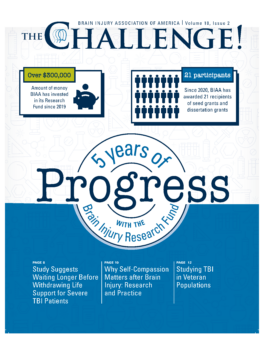THE Challenge! – Research
Categories: THE Challenge!

The Summer 2024 edition of THE Challenge! focuses on brain injury research.
From My Desk
In 2019, BIAA established its Research Grants program, with an overall theme and goal of finding cures for chronic brain injury. We know that brain injury is not a one-time event, but a sometimes lifelong condition, especially for the 5.3 million living with a permanent brain injury-related disability. It’s why we’re advocating for brain injury to be recognized as a chronic health condition. Brain injury must be identified and proactively managed as a lifelong condition to improve health, independent function, and participation in society.
5 Years of Progress with the Brain Injury Research Fund
In 2019, the Brain Injury Association of America established its Brain Injury Research Fund, setting a goal of finding cures for chronic brain injury. The program is grounded in the understanding that for some people, brain injury evolves into a chronic health condition that can cause or accelerate multiple diseases. To date, BIAA has awarded more than $300,000 to 21 recipients through the program. Read more.
Study Suggests Waiting Longer Before Withdrawing Life Support for Severe TBI Patients
When a person is hospitalized for sustaining a severe traumatic brain injury (TBI), their family and loved ones may be faced with the difficult decision to withdraw life support. Families of patients with severe TBI, which by current definition includes a period of unconsciousness, are often asked to make decisions about withdrawal of life-sustaining treatment within days of injury. But a recent study in the Journal of Neurotrauma found that both doctors and patients’ families are likely to make better decisions if they wait even a few days longer than they normally would. Read more.
Self Compassion and Brain Injury
Imagine you’re experiencing intense pain from chronic headaches. If you’re practicing self-compassion, you’re able to notice your pain and say something to yourself like, “I understand there’s a lot of pain right now. You’re not alone. I know you’re doing the best you can. I’m here for you.” But without self-compassion, your narrative would be something more like, “I can’t believe I’m in so much pain. Why won’t this pain go away? No one understands. I can’t do anything right.” How does it feel for you to read these different approaches? The truth is, we all intuitively know that meeting difficulty with warmth and care matters, but most of us have never learned how to approach our own pain in this way. Read more.
Studying TBI in Veteran Populations
More than 20 percent of adults in the United States have experienced at least one traumatic brain injury (TBI) in their lifetime. Among the military population, that percentage more than triples, with approximately 67 percent of veterans having experienced at least one TBI. And while history of TBI is associated with an increased risk of Alzheimer’s disease and other dementias, as well as a greater risk for suicide compared with the general population, evidence suggests that military veterans are also more likely to experience mental health challenges such as posttraumatic stress disorder (PTSD) and suicidal ideation following TBI, which may further jeopardize their long-term health and well-being. Read more.
Lieutenant Commander Uses Her Experience to Support TBI Survivors
Lieutenant Commander (LCDR) Jeanne Van Gilder, a native of Webberville, Mich., always knew she wanted to pursue a career in the Navy, particularly as a submarine officer. Inspired by her father’s service as a Naval Officer, her determination never wavered, even when submarines were not open to women. Her persistence paid off when, during her time at the University of Michigan, submarines were finally opened to women. Read more.
Promoting Helmet Safety Through Girl Scouts
My family and I moved to Northwest Arkansas nearly three years ago. Bentonville, Arkansas is often called the “Mountain Bike Capital of the World,” and you can’t go anywhere in the area without seeing someone riding a bike. Because of all the two-wheeling activity around here – whether it’s mountain biking, BMXing, road biking, or gravel riding – I decided to do my Girl Scout Gold Award project on traumatic brain injury (TBI) awareness and the importance of helmet safety. It’s an occurrence that affects many people on bikes. In fact, the number one cause of hospital visits among children is due to bicycle accidents, and the leading cause of death and disability is from head injuries. Read more.
State Affiliate News
See what the Brain Injury Association of America’s Affiliates have been up to. Read more.
Bringing Brain Injury Awareness to Children
When Katianne Olson’s husband sustained a traumatic brain injury in May 2020, she needed to figure out how to explain what had happened to their two young children. As a teacher, the first place she turned was children’s literature – but she soon realized that there weren’t any books that explained brain injuries to this young demographic. So, she set out to write her own book. As a result of her personal experience and extensive research, she penned The Resilient Brain, an illustrated children’s book that explains what traumatic brain injury is, how brain injuries can happen, and how brain injuries affect people, in a way that young children can understand. Read more.
Brain Injury Awareness on Capitol Hill
On March 5-6, hundreds of brain injury advocates came together on Capitol Hill for Brain Injury Awareness Day. More than 300 attendees from 38 states held more than 215 meetings with their Senators, Congressional representatives, and their staff to advocate for more services, more research, and more funding for brain injury, particularly through reauthorization of the Traumatic Brain Injury Act. In addition to facilitating congressional appointments, the event included an orientation and training session, a survivors’ meet and greet, and a Brain Injury Awareness Fair. Read more.
